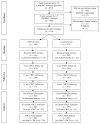Randomized trial of MST and ARC in a two-level evidence-based treatment implementation strategy
- PMID: 20658810
- PMCID: PMC3951378
- DOI: 10.1037/a0019160
Randomized trial of MST and ARC in a two-level evidence-based treatment implementation strategy
Abstract
Objective: A randomized trial assessed the effectiveness of a 2-level strategy for implementing evidence-based mental health treatments for delinquent youth.
Method: A 2 x 2 design encompassing 14 rural Appalachian counties included 2 factors: (a) the random assignment of delinquent youth within each county to a multisystemic therapy (MST) program or usual services and (b) the random assignment of counties to the ARC (for availability, responsiveness, and continuity) organizational intervention for implementing effective community-based mental health services. The design created 4 treatment conditions (MST plus ARC, MST only, ARC only, control). Outcome measures for 615 youth who were 69% male, 91% Caucasian, and aged 9-17 years included the Child Behavior Checklist and out-of-home placements.
Results: A multilevel, mixed-effects, regression analysis of 6-month treatment outcomes found that youth total problem behavior in the MST plus ARC condition was at a nonclinical level and significantly lower than in other conditions. Total problem behavior was equivalent and at nonclinical levels in all conditions by the 18-month follow-up, but youth in the MST plus ARC condition entered out-of-home placements at a significantly lower rate (16%) than youth in the control condition (34%).
Conclusions: Two-level strategies that combine an organizational intervention such as ARC and an evidence-based treatment such as MST are promising approaches to implementing effective community-based mental health services. More research is needed to understand how such strategies can be used effectively in a variety of organizational contexts and with other types of evidence-based treatments.
(PsycINFO Database Record (c) 2010 APA, all rights reserved).
Figures
Similar articles
-
The ARC organizational and community intervention strategy for implementing evidence-based children's mental health treatments.Ment Health Serv Res. 2005 Dec;7(4):243-59. doi: 10.1007/s11020-005-7456-1. Ment Health Serv Res. 2005. PMID: 16320107 Review.
-
A randomized controlled trial of multisystemic therapy and a statutory therapeutic intervention for young offenders.J Am Acad Child Adolesc Psychiatry. 2011 Dec;50(12):1220-35.e2. doi: 10.1016/j.jaac.2011.09.017. Epub 2011 Nov 6. J Am Acad Child Adolesc Psychiatry. 2011. PMID: 22115143 Clinical Trial.
-
Systematic Review and Meta-Analysis: Multisystemic Therapy and Functional Family Therapy Targeting Antisocial Behavior in Adolescence.J Am Acad Child Adolesc Psychiatry. 2025 Apr;64(4):427-446. doi: 10.1016/j.jaac.2024.10.008. Epub 2024 Oct 18. J Am Acad Child Adolesc Psychiatry. 2025. PMID: 39428056
-
An independent effectiveness trial of multisystemic therapy with juvenile justice youth.J Clin Child Adolesc Psychol. 2006 Jun;35(2):227-36. doi: 10.1207/s15374424jccp3502_6. J Clin Child Adolesc Psychol. 2006. PMID: 16597218 Clinical Trial.
-
Two-year follow-up of a randomized effectiveness trial evaluating MST for juveniles who sexually offend.J Fam Psychol. 2013 Dec;27(6):978-85. doi: 10.1037/a0034710. Epub 2013 Nov 4. J Fam Psychol. 2013. PMID: 24188082 Free PMC article. Clinical Trial.
Cited by
-
Causality and Causal Inference in Social Work: Quantitative and Qualitative Perspectives.Res Soc Work Pract. 2014 Sep;24(5):540-547. doi: 10.1177/1049731514536056. Res Soc Work Pract. 2014. PMID: 25821393 Free PMC article.
-
Placement and Delinquency Outcomes Among System-Involved Youth Referred to Multisystemic Therapy: A Propensity Score Matching Analysis.Adm Policy Ment Health. 2017 Nov;44(6):853-866. doi: 10.1007/s10488-017-0797-y. Adm Policy Ment Health. 2017. PMID: 28315074 Free PMC article.
-
Increasing clinicians' EBT exploration and preparation behavior in youth mental health services by changing organizational culture with ARC.Behav Res Ther. 2016 Jan;76:40-6. doi: 10.1016/j.brat.2015.11.008. Epub 2015 Nov 30. Behav Res Ther. 2016. PMID: 26649464 Free PMC article. Clinical Trial.
-
Organizational factors associated with community therapists' self-efficacy in EBP delivery: The interplay between sustainment leadership, sustainment climate, and psychological safety.Implement Res Pract. 2022 Jul 4;3:26334895221110263. doi: 10.1177/26334895221110263. eCollection 2022 Jan-Dec. Implement Res Pract. 2022. PMID: 37091086 Free PMC article.
-
Quality improvement, implementation, and dissemination strategies to improve mental health care for children and adolescents: a systematic review.Implement Sci. 2017 Jul 24;12(1):93. doi: 10.1186/s13012-017-0626-4. Implement Sci. 2017. PMID: 28738821 Free PMC article.
References
-
- Achenbach TM. Manual for the Child Behavior Checklist/4-18 and 1991 profile. Burlington, VT: University of Vermont Department of Psychiatry; 1991.
-
- Appalachian Regional Commission. Annual Report. Washington, DC: 2000.
-
- Barth RP, Wildfire J, Green RL. Placement into foster care and the interplay of urbanicity, child behavior problems, and poverty. American Journal of Orthopsychiatry. 2006;76(3):358–366. - PubMed
-
- Beeson PG, Britain C, Howell ML, Kirwan D, Sawyer DA. Rural mental health at the millennium. In: Manderscheid RW, Henderson MJ, editors. Mental health, United States, 1998. 1998. pp. 82–97. Vol. DHHS Pub. No. (SMA) 99-3285.
-
- Bjorklund RW, Pippard JL. The mental health consumer movement: Implications for rural practice. Community Mental Health Journal. 1999;35:347–359. - PubMed



